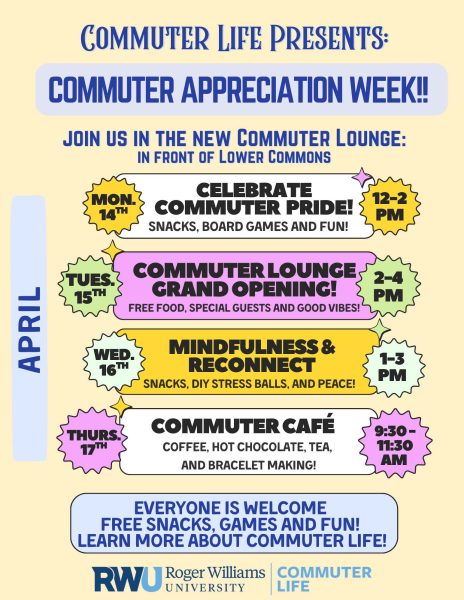Facing the facts: Peaceful protest draws awareness to micro aggressions in classrooms
Mariela O’Neill
Unshakeable tension is present at Roger Williams University. One cannot deny the medley of emotions students, faculty, and staff have experienced as a result of current events. Taking into consideration the recent tension and political anxiety of the 2016 Election aftermath, and the unavoidable truths of systemic injustice, confusion, anger, and rebellion that participants of the Poetry Slam conveyed last week, it’s no surprise that these events lead up to the Silent Protest that was held during Open House last Sunday.
On Nov. 13, 100 students dressed in black surrounded the Roger Williams statue in silence, solidarity, and protest. The silent demonstration bore no political agenda or antagonism, but was rather a call for university accountability.
In Spring 2015, the Multicultural Student Union hosted “Justice in the Classroom,” an event intended to raise awareness about negative classroom ethics due to microaggressions. Microaggressions are the verbal or nonverbal snubs and insults, whether intentional or unintentional, that target a marginalized identity.
A few examples of microaggressions that were reported are: “You’re so articulate for someone from Providence” and “Are you sure you’re from the United States?”
Students submitted either direct or indirect experiences of faculty expressing targeted and biased remarks within the classroom. For those in attendance, many were taken aback in disbelief and confusion, unaware that such instances occurred within the academic environment. Hostile and derogatory messages centered around marginalized identities are not only harmful to the receiver, but toxic for those who hear it.
The perpetuation of biases within academic settings gives rise to a cancerous campus community. It must be clarified that not all faculty members are maliciously purposeful in their remarks, but rather are ignorant to the multiple intersections of identity. Furthermore, acknowledging that not all faculty members are responsible or accountable for such assertions is critical for reconciliation.
Many students challenged the administration through the public showcase of grievances and demanded professional development regarding cultural competency; a professional development program that would enable and empower all faculty members in appreciating the beauty of human intersectionality. Cultural competency holds no hidden goals of shifting political ideology, but rather focuses on the philosophical approach of fostering unity. Regardless of political opinion, cultural competency is crucial in order to function in a diverse and globalized world.
The 2015 “Justice in the Classroom” event was deemed successful and impactful, with the administration promising meaningful action, and students were beginning to actualize a fine accomplishment. Unfortunately, the commitment became more distant than students had contemplated. Resistance from faculty and administration materialized in strikingly dismissive attitudes.
Disenfranchising student experiences is not only damaging to the individual, but destructive to the mission of Roger Williams University. Students sought to end the lip-service.
This semester in the Fall of 2016, alliances between students and Student Senate were created in lieu of the apathetic attitude hosted by the university. Student Senate drafted a bill that would demand mandatory professional development for faculty members. Faculty members must be required to possess the skills and tools to be consciously aware on how to interact, cultivate, and cherish human diversity. Upholding the values and convictions of Roger Williams, a man famous for shifting status-quo, must be demanded in pursuance of epitomizing the namesake of this University.
Junior international relations major Xante Chalwell was one of the participants in Sunday’s protest, and explained that the event was aimed at bringing awareness to an issue that not only manifests at RWU, but takes precedence in the greater world as well.
“We’re defining the administration’s lack of responsiveness to our needs because it’s not just a subsection of our community. It’s men, women, all different marginalized groups; even the people in classrooms when these incidents occur who feel uncomfortable that such ignorant things come from their professors. This is what the training will resolve,” Chalwell said.
The bill was recently introduced to Faculty Senate. However, several members of Faculty Senate, including President Farish, did not legitimize the necessity of such professional development, calling microaggressions within the classroom nonexistent and the term itself, “hip-lingo.” One cannot begin to communicate the gross amount of hurt, embarrassment, and frustration students’ felt from such cynicism.
Imagine attempting as a student to work in conjunction with the university to shift campus culture. Imagine attending numerous meetings where personal experiences and emotions are made vulnerable to whomever in the room for the purpose of enacting positive change. Imagine then being denied the validity of such experiences and emotions due to closed-ears. A dark disdain rises while the hopeful light cripples.
“[The school is] like a facade, kids come here [on Accepted Students Day/Open House/Orientation] and they’re like ‘Wow, I was put into a group. I stayed with that group and they made it look like the school was diverse, but when I got to the school in September, oh, look, nobody’s here.’ That’s what a lot of students are fed up with. They’re fed up with the administration’s efforts to keep the school white,” Chalwell said.
The event of “Justice in the Classroom” was not enough. Meetings with the administration were not enough. Student Senate’s bill seemed not to be enough. So what was it going to take in order for the university to legislate change? The answer was a Silent Protest during Open House.
One student who participated in the protest and wished to remain unnamed expressed that the purpose of the event was to create a sense of unity within the greater community through recognition of a common goal.
“The only quote we have to say as a whole is that this is about empowering our communities, and it really is about coming together and fighting for the cause in the sense of cultural competency training. We really are trying to come together as a community and enforce that. We’re not invisible; we are on this campus, and we want this to change, and we want this to happen. This isn’t just four people that want multicultural competency training, this is a whole community.”
The silence could not have been louder as parents and prospective students walked by, reading over 70 signs made by students, sharing personal truths. The Silent Protest was not an outlandish event, but another challenge for university accountability. What better way to make the university listen than by quietly observing?
Students have hit the tennis ball into the metaphorical court of the university time and time again. Will the university take charge and swing, or let the ball stay motionless as it has been for all these years. The choice is yours.




